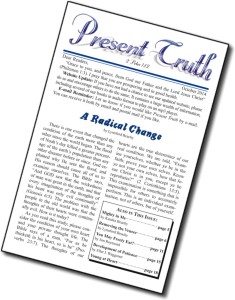 “Therefore being justified by faith, we have peace with God through our Lord Jesus Christ; by whom also we have access by faith into this grace wherein we stand, and rejoice in hope of the glory of God. And not only so, but we glory in tribulations also; knowing that tribulation worketh patience; and patience, experience; and experience, hope; and hope maketh not ashamed; because the love of God is shed abroad in our hearts by the Holy Ghost which is given unto us” (Romans 5:1-5).
“Therefore being justified by faith, we have peace with God through our Lord Jesus Christ; by whom also we have access by faith into this grace wherein we stand, and rejoice in hope of the glory of God. And not only so, but we glory in tribulations also; knowing that tribulation worketh patience; and patience, experience; and experience, hope; and hope maketh not ashamed; because the love of God is shed abroad in our hearts by the Holy Ghost which is given unto us” (Romans 5:1-5).
Here we have set forth the practical side of justification by faith. Not that justification by faith is not practical in every aspect, for nothing can be more practical than the forgiveness of sins. But this sets forth the practical every-day results of justification by faith. First there is peace that cannot be ruffled by any outside disturbance. It was such peace that, in Stephen and Paul, was superior to the howling mob that demanded their lives. Next there is joy, rejoicing in hope of the glory of God. Faith gives access to the grace of God. The grace of God is according to the riches of His glory. The glory of God will be according to the riches of His grace. The possession of grace makes sure the glory to be revealed; therefore whoever through faith tastes the riches of God’s grace, may rejoice in full assurance of glory to be revealed in Him. The faith that appropriates the grace of God reaches forward and grasps the eternal glory. As the apostle Peter says:
“That the trial of your faith, being much more precious than of gold that perisheth, though it be tried with fire, might be found unto praise and honour and glory at the appearing of Jesus Christ; whom having not seen, ye love; in whom, though now ye see Him not, yet believing, ye rejoice with joy unspeakable and full of glory; receiving the end of your faith, even the salvation of your souls” (1 Peter 1:7-9).
But our rejoicing in hope of the glory of God is not because we have so easy a time, with no trials. Notice in the text just quoted that the “joy unspeakable and full of glory” is coupled with such trials as can be likened only to the fierce flame that heats the crucible in which the gold is placed. So in the passage before us. “We glory in tribulations also.” Why?-Because “tribulation worketh patience; and patience, experience; and experience, hope.” Let us note these points. We know something of what tribulation means; shall we study how it works patience, what the experience is which results, and what the hope?
Most people think that tribulation works impatience. That is a great mistake. It is true that even petty trials that are not worthy to be listed in the same catalogue with tribulations are often followed by impatience; but they never beget impatience. They simply reveal the impatience that already exists. Many people think to excuse their irritability by pleading strong provocation. If other people were not so exasperating, they would not become impatient. Wrong. If other people did not cross them, they doubtless would not manifest impatience. A dog or a bear may say the same; they will not show their teeth, and growl, unless provoked. But their nature is none the less fierce. Circumstances and associations do not make us impatient and wicked. They may tend to draw it out; but they cannot make us manifest that which we do not have.
Tribulation works patience only in those who, being justified by faith, have peace with God. Nothing but tribulation can work patience; there is no other way that patience can be developed, except by trials; the fiercer the trials, the more the patience, the greater the experience, and the brighter the hope.
What is patience? It is simply endurance. The ox is a symbol of patience, because it quietly bears the yoke, and endures heavy loads and even blows. Now how can a man bear and suffer, and show a disposition of quiet perseverance, unless he has trials. There is no call for patience when there is no burden to bear. As the muscle that is never exerted in carrying burdens can never develop strength, so the soul that never has trials can never develop patience. Patience is necessary, for only he in whom patience has its perfect work, is “perfect and entire, lacking nothing” (James 1:4). Therefore tribulations are necessary. Surely we may rejoice in that which works perfection, and brings to us every possible good.
How does tribulation work patience? The fact that it does so only in those who are justified by faith in Christ, suggests the answer. It is only when the relation between us and Christ is very close. Let us put it in the form of a paradox, that it may be the more strongly impressed on the mind. Tribulation works endurance only when we learn how not to endure it. We endure the burden which tribulation imposes upon us only by throwing it off. Let the following texts serve as proof:
“Be not anxious for your life, what ye shall eat, or what ye shall drink; nor yet for your body what ye shall put on.… For your heavenly Father knoweth that ye have need of all these things” (Matthew 6:25-32, Revised Version).
“Humble yourselves therefore under the mighty hand of God, that he may exalt you in due time; casting all your care upon Him; for He careth for you” (1 Peter 5:6, 7).
“Cast thy burden upon the Lord, and He shall sustain thee; He shall never suffer the righteous to be moved” (Psalm 55:22).
The apostle Paul was called upon to bear heavy burdens, and to endure great suffering, and he says this of the amount of his burdens, and how he bore them:
“But by the grace of God I am what I am; and His grace which was bestowed upon me was not in vain; but I laboured more abundantly than they all; yet not I, but the grace of God which was with me” (1 Corinthians 15:10).
He who has been justified by faith has laid upon Christ the greatest burden that can be borne-the burden of sin. Christ died for the purpose of assuming this burden, which men could not bear. “Who His own self bare our sins in His own body on the tree” (1 Peter 2:24). Now the justified person finds trials pressing upon him; but he has already learned of Christ’s power, and has proved the truth of His gracious promise, “Come unto Me, all ye that labour and are heavy laden, and I will give you rest” (Matthew 11:28). He knows that he himself has not the strength to endure these trials without being irritated; the load will prove too galling for him. So he bears it by casting it upon Christ, which he has the fullest warrant to do. “He that spared not His own Son, but delivered Him up for us all, how shall He not with Him also freely give us all things?” (Romans 8:32).
Thus not the mere doctrine, but the actual fact of justification by faith, becomes the soother of all pains, the supporter in every trial, the strength in every duty. We do not know how we are going to be fed and clothed, if we follow some clearly indicated line of duty. What of that? “Is not the life more than meat, and the body than raiment?” (Matthew 6:25). The greater includes the less, and if God has given His Son, that carries every needful thing with it. What shall we say of the faith of one who professes to know Christ, and yet is continually worrying and fretting for fear of some calamity, or murmuring at little ills that befall him? Surely if his faith does not enable him to trust under these smaller trials, how can he know anything about God? If faith in Christ is good for anything, it is good for everything. And that is just what it is good for. “Godliness is profitable unto all things, having promise of the life that now is, and of that which is to come” (1 Timothy 4:8).
And patience works experience. Of course. Experience in what? Why, experience, or proving of the power of God to keep us even in the little vexations and trials of life, as well as in the tribulation that comes in time of great persecution. Only trials can give us this experience, for only trials and afflictions drive us to test the power of God. And remember that this “experience” is simply experience in the willingness of God to bear all our burdens, so that the peace of God, and not impatience, may rule in our hearts. And yet men and women who never in their lives cast a single burden on the Lord, who never took the every-day trials of life to the Lord for him to bear for them, and who consequently were developing impatience and fretfulness, often talk about their “Christian experience.” Such should learn that experience is something more than a mere profession.
The limits of this article forbid a consideration of the hope that maketh not ashamed, which this practical experience begets. Another article must be devoted to that. But if the reader will only make the experiment of laying hold by faith upon the power and love of God, he will know by experience what the hope is.
(This article was taken from the May 21, 1891 issue of The Present Truth.)

